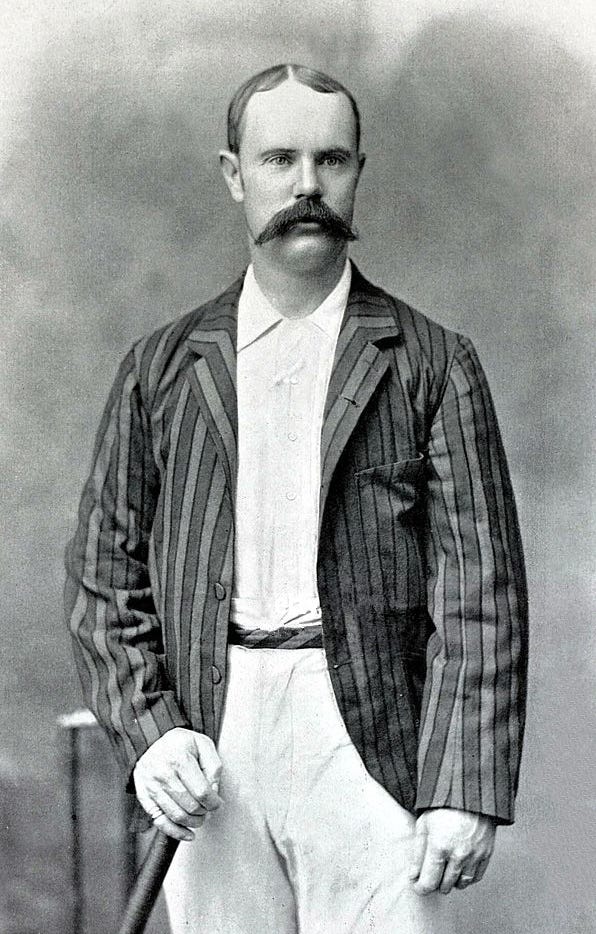OBITUARY: ALEC BANNERMAN
Alec Bannerman, the stonewalling Australian opening batsman and a younger brother of Charles Bannerman, who scored a century in the first-ever Test match in 1876/77, has died in Sydney at the age of 70. Alec played in 20 Test matches for Australia between 1878/79 and 1893, and toured England six times between 1878 and 1893. He scored 1108 runs in Test matches at an average of 23.08, and was also a superb fielder.
SOUTH AFRICAN TOUR REVIEW
The (all-white English-speaking) South African team suffered seriously from the appalling weather this season, just as they had in their two previous tours, 1907 and 1912. Their full first-class record is:
Played 35, Won 8, Lost 9, Drawn 18.
Won — Scotland, Cambridge University, Essex, Hampshire, Northamptonshire, Harlequins, Somerset, Worcestershire.
Lost — ENGLAND (3 times), Nottinghamshire, Lancashire, H D G Leveson Gower’s XI, Minor Counties, Kent, C I Thornton’s XI.
Drawn — ENGLAND (twice), Leicestershire, Derbyshire, Surrey (twice), Gloucestershire, M.C.C., Yorkshire (twice), Oxford University, Warwickshire, Lancashire, Middlesex, Sussex, Glamorgan, Combined Services, South.
Most people were confident that the South Africans, after their good showing against Frank Mann’s team in 1922/23, would be able to give England a good fight on this tour, but it did not prove to be the case. It was accepted that they would not find it very easy to play on turf pitches rather than their own matting, which was one problem, but the appalling weather was worse than anyone could have anticipated, and the tourists had to play most of their matches on soft, slow pitches in cold, dull, rainy weather.
They also had problems with injuries. Buster Nupen is a tremendously effective bowling on matting, but he was never much of a threat on turf pitches, no doubt partly due to the fact that in the first match of the tour at Leicester he strained himself on the wet field and never quite recovered; in fact before the end of the tour he had to drop out of the side. George Bissett, the 18-year-old fast bowler whom they hoped would develop into the spearhead of the attack, did not take well to the conditions, and then midway through the tour he broke an ankle bone and could not play again. The South Africans had to call up Sid Pegler and George Parker, neither of whom had been selected originally. Parker was too raw and soon disappeared back to league cricket, but Pegler became a mainstay of the team. Jimmy Blanckenberg took the most wickets and Claude Carter headed the bowling averages, but neither of them really troubled the best batsmen. The bowling was overall the team’s biggest weakness.
The batting was stronger, built as it was around that fine pair of the captain, Herby Taylor, and the veteran Dave Nourse. Taylor didn’t quite live up to his reputation of being in the opinion of many the best batsman in the world after Jack Hobbs, but he played many fine innings, occasionally giving exhibitions of his true brilliance, and Nourse was not far behind. Fred Susskind, ungainly though he often appears to be, has shown a remarkable advance in English conditions since his years at Cambridge University, and Bob Catterall, though rarely coming off in the county matches, played brilliant attacking innings in three of the five Test matches. He generally opened the innings in the past, but in England he was more successful when moved down the order. Mick Commaille proved a solid opening batsman and Nummy Deane, a brilliant cover fielder, played some good innings when they were needed.
So far as fielding is concerned, the side were often brilliant in the outfield, but less reliable close in. Overall Deane was the best of them all, and Tommy Ward was an outstanding wicket-keeper, rated one of the best in the world, who also proved a dogged stand-in as an opening batsman when Catterall was moved down. Taylor is not a natural captain and he did not show great tactical or inspirational ability, but he had a difficult job with such a limited bowling attack. The South Africans always played the game in fine spirit; they were a very popular team and there were no unpleasant incidents of any kind.
John Ward is an ACS member and a long-serving Zimbabwean cricket statistician. If you would like to contribute to this newsletter, please either respond to the email in which you received it, or leave a comment below.





